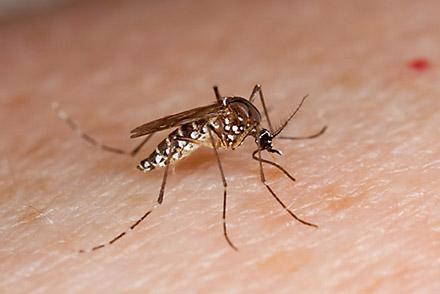Honeysuckle’s Sweet Scent Not So Kind to Mosquitoes
The delicate scent of honeysuckle in the air is a pleasing sign of summer’s approach. However, this perennial flowering vine also packs a powerful punch when it comes to knocking out the larvae of mosquitoes, including Aedes aegypti, the species that spreads yellow fever.
In laboratory studies by Agricultural Research Service (ARS) scientists, essential oils in Italian honeysuckle killed 100 percent of the larvae, which hatch from eggs deposited in sources of water by adult female mosquitoes after they’ve taken a blood meal—such as from you!
Entomologist Ephantus Muturi and his colleagues at ARS’s National Center for Agricultural Utilization Research in Peoria, Illinois, investigated honeysuckle as part of a larger project to identify and develop biobased alternatives to synthetic insecticide ingredients, which some consumers may be wary of using.
The team’s efforts aim to provide consumers and public health officials with a greater arsenal of weapons to choose from in preventing the diseases that mosquitoes can spread, including yellow fever, Zika, dengue fever, and malaria—the last of which is linked to 219 million reported cases and 435,000 deaths worldwide in 2017.
Adding to that threat is the potential for some mosquito populations to develop resistance to the insecticides used against them, notes Muturi, who is in the Peoria center’s Crop Bioprotection Research Unit.
In all, Muturi and colleagues identified 16 different compounds in the essential oils of Italian honeysuckle. The oils are found in the plant’s stem, leaves, and distinctly shaped flowers and give rise to its alluring scent, which fills the air starting in late spring, depending on the region.
Of the compounds tested, the one that delivered the knock-out punch was patchouli alcohol, a discovery that could open the door to formulating it as a biopesticide that can be safely applied to such mosquito larvae “haunts” as ponds, drainage ditches, stormwater catch basins, and even kiddie pools.
The researchers don’t envision growing and harvesting honeysuckle for its essential oils, though. After all, some species—like Amur honeysuckle, which can be found throughout much of the eastern United States—are considered invasive. Instead, the oil and some of its bioactive chemical constituents, such as patchouli alcohol, can be purchased commercially and are commonly used as active ingredients in perfumes and other cosmetics products. However, until the team’s studies (which were published in Pest Management Science), the added benefit of killing mosquito larvae hadn’t been shown.
Muturi’s group plans on scaling up its studies of the insecticidal potential of honeysuckle essential oil and its chemical constituents, along with compounds from other plants. They’re also examining microorganisms such as fungi that infect and kill different mosquito life stages, diminishing the biting pest as a public nuisance and health threat.—By Jan Suszkiw, ARS Office of Communications.
You May Also Like
- Breaking Down Mosquito Bites
- Biological "Green" Alternatives to Chemical Pesticides
- Cuphea Oil Chemical Repels Pests


